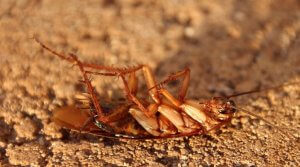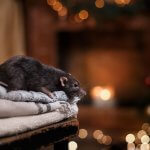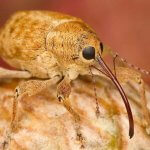With the cold sharp winds of winter comes that extra layering of clothes, snow, sleet and a host of other not so nice associations. In that same vein, the season also brings some very unwelcome house guests, whom unlike visiting relatives, may not be so easy get rid of without professional help from local pest control experts.
These intruders include but are not limited to: squirrels; pantry pests; birds; bats; rats; mice; raccoons; cockroaches; fleas; bed bugs; moths and spiders that all looking to escape frigid temperatures and settle into a warm place to call home.
Specific Residential Winter Pests To Look Our For
The followings is not the kind of list that old bearded guy in the red suit checks twice every Christmas. This one concerns some very unwanted holiday gifts that unfortunately cannot be redeemed at your local department store. Instead, they must be eliminated via the expert application of pest control and pest-management strategies implemented by your local pest control company, or if you’re in the Greater Pittsburgh area, call Pestco Professional Services — (412) 252-5200!
German Cockroaches
These roaches represent a severe problem during the colder months of the year and they are found everywhere across the United States in sweeping numbers. They infest residences and nest within the interior walls of houses and apartments especially where temperatures are higher than 50 degrees.
They can survive an entire winter without reproducing as long as they can find food and warmth, but they make up for lost time in other warmer seasons and reproduce at remarkable rates within the rafters and sheet rock of the average residence.

German cockroaches contaminate food sources and spread bacteria and human pathogens. Cockroach carry allergens that are dangerous triggers for symptoms of asthma particularly in vulnerable children. Once inside a home, they are difficult to eliminate without the professional guidance of pest-control and pest-management experts.
They are usually found in kitchens and bathrooms and most often gain ingress via grocery bags and used appliances. (Remember this and look before you buy that bargain toaster at the thrift store.)
Brown Recluse Spiders
Brown recluse spiders are solitary, secretive critters and they prefer to spin webs in quiet, warm, dry and dark places, such as closets, attics, crawl spaces and basements. They are often found inside cardboard boxes, along window moldings and inside seldom-used clothing and shoes. These spiders can bite and their venom can be harmful to humans.
Raccoons
Raccoons are found in forests, marshes, prairies, and they gain ingress to residences in urban areas via attics or chimneys in search of a place to nest. They are adaptable and use their dexterous front paws and long fingers to find and feast on whatever food may be available. Raccoons are a major host of rabies in the United States and the Center for Disease Control and Prevention (CDC) states that raccoons are the most frequently reported rabid wildlife species.
House Mice
It is likely that that the “creature not stirring, not even a mouse” in that iconic Christmas poem written by Clement Moore was probably a reference to a house mouse, with is the most commonly encountered rodent in the United States. They usually nest in dark, secluded areas like attics and basements and can cause serious property damage and electrical fires by chewing through drywall and wires. They also contaminate food and spread disease.
Norway Rats
Norway rats often nest in basements and piles of debris and they are known to eat anything they can find. In their quest for food and water, this includes plastic or lead pipes. They can fit through an opening the size of a quarter. Norway rats carry a number of diseases including: jaundice, rat-bite fever and cowpox virus. Here are nine prevention tips to protect your home from rodent infestations, or you can just call us — (412) 252-5200!
Bedbugs
These small, oval, brownish invasive insects live on the blood of animals or humans and can enter your home undetected via luggage, clothing, used beds and furniture. Bedbugs have been known to fit into spaces about the width of a credit card. Even though below-freezing temperatures can kill bed bugs, they can survive the cold for a brief time.
If temperatures do drop significantly, bed bugs will enter a hibernation-like state where they can survive without feeding for months. Eliminating the critters is not a do-it yourself procedure and it requires the expertise of the pest-control and pest-management specialists at Pestco Professional Services. Here are 12 helpful tips to keep your home bedbug free throughout the fall and winter months.
Pantry Pests
Pantry pests are hitch-hikers and find entry into homes via pre-packaged foods and grains for food storage. Pet and animal foods, including grains and seeds for chickens and song birds, can also be the source of infestation. The most common pantry pests are small beetles and moths. Ants, weevils and beetles are particularly problematic around Thanksgiving and Christmas because they love to eat rich, carbohydrate-heavy holiday treats and foods. Here are 10 tips to protect your home from pantry pest infestations.

Birds
While birds are generally beneficial creatures, some species can become pests during the colder months of the year because of the damage they can inflict to homes and buildings.
Species such as woodpeckers, sparrows and European starlings have been known to peck away at the sides of houses in addition to creating a mess with their droppings, which, when they become dry and turn into dust can penetrate air vents and cause asthma and other allergic reactions. Other winter pest species include: finches; chickadees; pigeons and the tufted titmouse.
This type of infestation must be addressed by bird removal professionals. Birds tend to flock in large numbers and return to the same spot, year after year, which means a property owner can repair damages to rooftops and other structures only to be forced to do the same thing all over again the following year.
The below bird removal project was performed by our team members last Summer.

Bats
Seeking warm dry places away from winder cold, bats are attracted to attics, chimneys, and walls. When they roost in your attic, they multiply very quickly and become a serious problem. Due to the fact that they almost always live in attics, these nocturnal critters use the same entry and exit points to access a home, which are usually situated around the roofline. Bat droppings, known as guano, dry up, and when they are inhaled can cause serious lung infections. They are also vectors of rabies.
Squirrels
Squirrels love attics and the insulation they usually find there. They shred it to pieces along with ductwork. They are very destructive and are known to gnaw through loose roofing or slip through chimneys and quickly set up their nests.The greatest danger from a squirrel infestation is the fire hazard they create. If squirrels find the wall space covering the electrical wiring, they can gnaw through it and set your home on fire. Squirrels are also primary carriers of tick fever, powassan encephalitis, and rabies.
Fleas
Since fleas do not hibernate during the winter, an infestation inside a home can flourish during the colder months of the year. Fleas are difficult to eliminate as once they gan access to a home with warmth and a food source, they tend to stay there.
11 Tips To Protect Your Home Against Winter Pests
Clean your home and kitchen regularly
To avoid German cockroaches from making your home their winter palace so to speak, keep counters and floors free of crumbs, vacuum frequently, dispose of garbage regularly and pay special attention to areas such as under kitchen appliances and bathroom sinks.

Keep trees and shrubs trimmed away from your home
Reducing the chances that a recluse spider will find its way into your home can be accomplished by keeping trees and shrubs trimmed away from the residence and cutting back limbs that may be overhanging your roof. Also, do not leave clothes and shoes that are stored in basements or garages lying out on the floor and shake them out before wearing. Spiders like to hide inside plastic containers particularly those storing clothing gloves and shoes.
Store trashcans and recycling bins in sealed areas
Due to the fact that raccoons love trash, homeowners should store trashcans and recycling bins in sealed areas whenever possible. If trashcans are kept outdoors, use animal-proof lids. In addition, make sure that chimneys have mesh covers to prevent ingress.
Store boxes up off of your home’s floors
Keep areas clear and store boxes off of the floor because mice like to hide in clutter.
Eliminate moisture in crawl spaces and basements
To prevent Norway rats from entering your home, eliminate sources of moisture in crawl spaces and basements. Don’t forget to also inspect inside the home for signs of an infestation on a regular basis. This includes watching out for greasy marks left by the rat’s oily fur.
Avoid buying used clothes, bedding and other furniture
To avoid bed bug ingress, select an area in your home to inspect all delivered packages. Avoid buying used clothes, bedding or furniture.
Inspect grain-based foods immediately after buying them
To prevent a pantry pest infestation, inspect grain-based foods immediately after purchase and then periodically during storage. Only buy the amount of grain products for use within a two-month period. If longer storage time is required, it is best to store whole rather than ground or processed grains. Only grind the amount needed for a week or so.
Engage effective exclusion services to shore up entry points
Exclusion is the only effective means to remove bats. If the indoor climate is cool enough, bats will eventually migrate, permitting the sealing of any cracks in the chimney. Place a mesh barrier over the main opening.

Engage a quality pest control company
Squirrel control is a job best left for the professionals at Pestco. While home owners might be able to trap and/or kill one squirrel, the health risks and the common pitfalls that arise from taking this matter into your own hands simply aren’t worth it.
Ensure your home & property are free of holes & downed trees
To deter an infestation of winter birds, make sure your home and property are free of holes and downed trees where these birds can nest.
Treat your pets with safe flea medications
Due to the fact that pets are their favorite hosts, treat your pets with medications that will kill flea populations living in their body fur.
Pittsburgh Pest Control Services
Our teams at Pestco Professional Services offer Pittsburgh homeowners the best integrated pest control and pest management services.
In continuous operation since 1948, our pro-active approach entails an extensive and thorough examination of the affected facility and the sealing up of any cracks and crevices that might permit insect entry. Inspections are ongoing throughout the year. Each infestation is unique and we are all about versatility.
Our technicians are all licensed by the Pennsylvania Department of Agriculture and attend monthly workshops to help keep them always a few steps ahead of the winter pests that are damaging your home and causing distress among family members.
In Conclusion
So follow the above mentioned tips to protect you’re home throughout the upcoming winter months, or if you live anywhere in West Mifflin, Sewickley, Coraopolis, Fox Chapel, Tarentum, Allison Park, Shaler, North Hills, South Hills, Bethel Park, Mount Lebanon, Clairton, Homestead, Monroeville, South Hills, North Versailles, White Oak, Cheswick, Bridgeville, Upper St. Clair, Elizabeth, Swissvale, McKees Rocks or Wexford, and you’re looking for the ultimate in pest prevention and pest management, call Pestco today and transform your home into a pest-free residence tomorrow — (412) 252-5200
Final thought on winter pests: I just tried to kill a spider with hairspray. He’s still alive, but his hair is outstanding! ~ Pinterest

 Over 300 Reviews
Over 300 Reviews 

